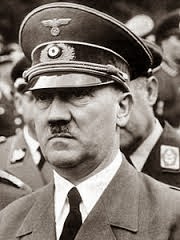But there’s much more to Hitler than his murderous behaviour. There are other aspects of his time in power with which comparisons are well worth making. Especially when they can teach us lessons about today.
 |
| Not just a mass-murderer. He had plenty of other faults |
That agreement, signed on 30 September 1938, was to guarantee ‘peace in our time’. Hitler wanted the Sudetenland but no other part of Czechoslovakia, he assured the other statesmen. Granted his wish to occupy just those parts of the country, he would leave the rest alone and Europe need not fear war.
On 16 March 1939, German forces occupied the rest of Czechoslovakia. Britain and France took no action.
Less than six months later, the German army rolled over the border into Poland. Though bound to defend Poland by Treaty, it took two more days of heart-searching and indecision, before Britain and France at last declared war on Germany, and the European theatre of World War II got fully under way.
Now roll forward three-quarters of a century.
Vladimir Putin feels himself honour bound to come to the defence of his compatriots, the Russian-speakers of Ukraine. ‘Self-defence’ forces, that look extraordinarily like Russian troops without their insignia, have seized control of Crimea. Optimists may believe that Russia can be persuaded to hand the region back to Ukraine; realists, and that includes the main governments of the West, know that there’s no prospect of that happening. It was, after all, a traditionally Russian area, and there’s overwhelming local support for a return to the motherland, undoing a unilateral decision of Nikita Kruschev sixty years ago.
Will Putin stop there? Maybe. And if he does, we can no doubt learn to live with that. Perhaps Ukraine, too, can lick its wounds and come to terms with its loss.
This is where the comparison with Hitler becomes illuminating. Making concessions to Hitler meant feeding his appetite. Handing him territory only made him push his luck further and try to get still more.
There are Russian speakers in Eastern Ukraine too, including its second biggest city, Kharkiv, and the great industrial centre at Donetsk. Will Putin feel the same obligation to ‘defend’ them as he has ‘defended’ Russian speakers in Crimea? And Hitler ‘defended’ the German speakers in Czechoslovakia?
There’s also another lesson. When we did stand up to Hitler, it cost us a bloody war – the bloodiest the world has seen. War with Russia today, however, would probably put the war against Hitler into the shade. It might, indeed, threaten the very existence of humanity.
The fact that no one seems keen on the idea of military intervention against Putin strikes me as thoroughly welcome. On the other hand, appeasement doesn’t work either, if we can learn anything from the experience of Hitler.
But between war and appeasement there are surely a great many other possibilities. What is much less edifying about the behaviour of Western governments today, is the rapidity with which they seem to be ruling out any kind of economic action, even though such measure might actually get Putin’s attention: imagine if he and his oligarch friends found themselves hurting in their wallets.
Instead, the message from Western capitals seems to be that we’re prepared to do whatever it takes, as long as it doesn’t cost us anything.
The only worry? If we’re not prepared to pay any cost today, the cost we may face later might be far higher.
That’s another lesson to learn from our experiences with Hitler.
 |
| Putin may not be a mass murderer but he still needs to be stopped |
1 comment:
Why compair to Hitler, have you never met Russians on holiday? They at the most obnoxious individuals you could meet and are far more reasonably measured against the Mffia. Have a go at meeting them in a place like Cyprus or Cuba. Very devious crowd.
Post a Comment